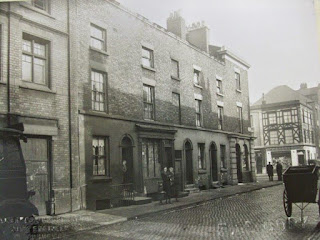James and Ellen Neill were in their forties and had lived in Vulcan Street for twenty years. James was a labourer at the nearby docks and both drank heavily, with Ellen appearing in court thirteen times for drunkenness.
On Wednesday 29th August the Neill's neighbour Mrs Doyle heard them arguing over money and when she went to see if everything was ok, she found Ellen cowering in the lobby, with James screaming that he would 'swing for her' if she didn't find some money. What happened after that isn't clear, but at 9.30am James was brought back in a drunken state from a local pub by one of his five children and went to bed to sleep it off.
At around 4.30 that afternoon Mrs Doyle heard arguing again and went around, where she saw James banging Ellen's head against the tiled floor. Mrs Doyle sent one of the children to find a policeman and was then powerless to prevent the sustained attack, that then consisted of James standing on a bacon box over his wife's stomach and kicking her at least twenty times. He then told her that he would roast her and started kicking hot cinders from the fire over her now nearly naked body, her clothes having been largely torn off.
Unbelievably, when PC Palmer arrived he was invited by James to 'come in and see the drunken bitch' and after seeing Ellen lying on the floor with vomit over her and concluded that she was drunk and went away. The following afternoon another policeman called for a medical examination and a doctor found bruises on her eyelids and neck, as well as burns on the chest, but again no action was taken.

Ellen remained in bed for three more days, with James spending most of Saturday 1st September, the day she died, at her side. He made no comment when being taken into custody except to say he hadn't intended to kill her. Two days later the Coroner's court returned a verdict of wilful murder.
James was tried at the Liverpool Assizes on 22nd December, and it was fortunate for him that Mrs Doyle was ill and unable to give evidence. James's defence counsel suggested that Mrs Doyle had a grudge against him,and also managed to cast doubt on the injuries to the brain that caused Ellen's death as the doctor who carried out the post mortem said they could have been obtained by falling.
The jury in the case returned a verdict of manslaughter. In passing sentence, Mr Justice Wills told James that he had engaged in 'desperate violence with an utter recklessness of consequence' and ordered that he serve sixteen years in gaol.



































